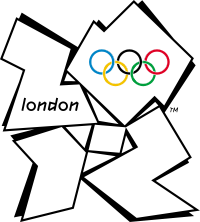The Olympics Brand Police can’t stop your customers linking you to London 2012

So the biggest sporting event in the world is about to start in my home town this weekend, but in London the opinion of the games has been marred by a series of cock ups. Whilst we know that our mayor is a bit of a ‘character’ and that our outsourced agencies aren’t really up to what they claim to be, one of the biggest things to mar the games has been the Olympics Brand Police.
In case you are not aware, the set up of the stadiums for the games have been largely paid for by the Government and by persuading sponsors to impart large amounts of money to have their brands splashed across the games as much as they can (although not in the stadium it should be added). To make sure that the companies are getting value for money, the Olympics have hired up to 300 brand police to stop other brands taking advantage of the games without spending the money on sponsorship.
It makes sense in a way, because if you are a company called Blue Widgets and you spend millions of pounds on advertising for the Olympics and then Red Gizmos get more exposure because they claim they are associated with the Olympics but don’t spend any money on it, then you’ll be annoyed. More importantly you won’t bother next time and instead of sponsors stumping up £1.5bn, next time around the taxpayer will have to.
So to stop this the Brand police make sure that brands who haven’t paid aren’t associated with the games.
Makes sense in an offline world (although you could debate if they have overstepped their mark by stopping a guy selling sausages in a ring)
But it doesn’t make sense in an online world.
Why?
Because in an online world most of the stuff you do isn’t related to companies. Whilst Red Gizmos won’t be putting up a sign on their website saying they were sponsoring the Olympics, its more or less impossible to stop them writing tweets about it, posting on their Facebook about it, putting conversations on their Google+ page about it.
So in a pure online world it makes no sense to have brand police at all. This was brought to home to me in an article in the Guardian by satirist Stewart Lee where he created an imaginary situation where he’d been censored by the Olympics for tweeting about the Olympics.
“But hang on,” I said. “My Olympic Rings tweet was just a joke. It had no commercial application.” “Well, we would argue that it did,” offered the lead Olympic Advertisement Enforcement Officer, Leslie Macintosh, and asked me what I thought the point of my Twitter feed was.
Without thinking it through, I answered: “Well, to flex my comedy muscle and to maintain links with the people who come and see me live and buy all my DVDs.”
“Exactly,” she said. “So in other words your appropriation of the Olympic symbol served the purpose of furthering your own business interests. We’re not monsters. We can’t, and wouldn’t, stop an ordinary member of the public using the phrase ‘Olympic rings’ to another member of the public, even if they were using it as a euphemism for anuses, but the fact that you can generate increased income by using the phrase means you are in contravention of our sponsors’ agreements.”
There are already strict rules in place for people who use Twitter for advertising (in the UK) as shown by a couple of Advertising Standards Authority rulings.
In June Wayne Rooney and Jack Wilshere were reprimanded for posting tweets that were paid for advertisements by Nike as the two footballers didn’t make it clear that the tweets were paid for by Nike. Ironically enough Nike bore the brunt of the pain from the press, whilst Rooney and Wilshere managed to make it appear that they were the innocent party in all this and maintained their following.
This case followed one against Rio Ferdinand and Katie Price (AKA Jordan) who had tweeted on behalf of Snickers, but in that case the ASA claimed that it was obvious that they were advertising tweets.
Maybe accidentally Stewart Lee has stumbled across the whole trouble with brand policing Twitter and the web. There are no rules for when someone is associating themselves with something that they have no real right to.
In that sense the value of the Olympics is going to go down for advertisers. I can associate my blog quite easily with the Olympics just by writing about it, Google will now be indexing my blog in for search phrases including ‘web analytics Olympics’, I can tweet about my connection to the Olympics, I can post it on my Facebook page and I can put it on my Google+ page.
So as a brand what can you do when you want to relate yourself to the Olympics if you’re not an official partner?
- Make sure there is nothing that could be directly construed as relating to your products and the Olympics (don’t put the rings in your logo)
- Don’t create any new Olympic themed products
- Suggest that when they watch the Olympics they use your product,
- When they are tweeting about the Olympics you are relating to what they are thinking,
- You post stuff on Facebook about the Olympics
- Create conversation around the Olympics and your brand so that you don’t have to do the Marketing


Well I only had this up on my screen for ten minutes and the OBP broke my door down, just for looking.